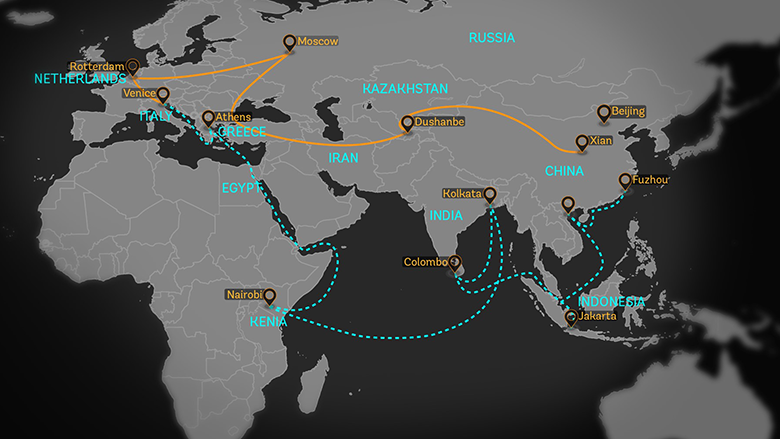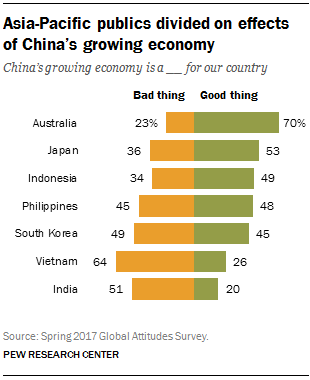
Chinese officials call the digital Silk Road a "community of common destiny in cyberspace." But as Beijing begins implementing its digital strategy and starts installing digital hardware and networks in countries with authoritarian tendencies, like the Philippines, Malaysia or Zambia, there are concerns over what values this "community" will possess.
According to Expert the intangible components" of the digital Silk Road initiative , is for Beijing to promote its own version of internet governance norms.
"For semi-authoritarian countries around the world, a great number of which are under the BRI umbrella, the Chinese model of digitally enabled surveillance of their population probably appears quite appealing and welcoming to them.
As Many BRI countries become dependent on China for their internet, they also open the possibility of Beijing monitoring and diverting their data traffic, feeding China's intelligence collection and technological advances in areas such as AI and other key data needed for developement.
Alot of expert still have a skeptical view about China Role and fitness to dominate the world communication Infrastructure sector because of it's track record of stealing Intellectual properties.
In reality USA does not support the Chinese vision and modernization because is a great danger to the economy of the world and the Americans.
"Given its extensive surveillance, given its censorship, and given the fact that it has for years been stealing intellectual property, it is wholly problematic for USA to trust China again.

For Belt and Road countries in Africa and Asia with less-developed infrastructure, China is offering a chance to catch up with the high-speed digital world. For example, Huawei is building Zambia's communications infrastructure from the ground up, and Chinese e-commerce giants Alibaba and Tencent are planning services for small businesses in Southeast Asia.
But if tension between the US and China on standards and regulation grows, BRI countries that have been hooked up with Chinese technology could one day be operating on a separate system. Although there is nothing stopping these countries from using Western tech, Chinese firms can currently offer a high-quality product at a lower price than their Western Tech Counterparts.
But why should we be afraid of China ?

The Views of China’s economic growth are mixed across the Asia-Pacific region. There is little consensus among the seven countries surveyed there about whether China’s growing economy is more of a good thing or a bad thing for their country.
Three say the former, two the latter and two are nearly evenly split. Australians are most positive about China’s economic growth; by a three-to-one margin, more people say China’s economic growth is good for Australia than bad. In contrast, only 20% of Indians see China’s economic rise as a good thing for their country. The Asia-Pacific region is also one of the regions where most people name the U.S., not China, as the top global economic power.
Although China’s power and influence is not seen as a top threat globally, many in Asia-Pacific countries see it a key concern. Outside the region, a median of 27% see China’s power and influence as a major threat to their country. But among the seven Asia-Pacific countries surveyed, a median of 47% see it as a major threat. South Koreans and Vietnamese even rate China’s power and influence as the top threat facing their nations. Concerns about China also outpace concerns about the United States across the region; a median of 35% say U.S. power and influence is a major threat to their country.
However only time will tell what the future hold for us, but in reality China and USA are not in good terms with each other but will this division divide us even the more and impact in Africa ? These are question we have to ask ourselves .
The rivalry risks dividing the world with a digital iron curtain. The potential for bifurcation is already noticeable, as U.S. allies including Australia and New Zealand have banned Huawei and ZTE from providing equipment for 5G wireless technology on national security grounds and Canada arrested Huawei Chief Financial Officer Meng Wanzhou in December on allegations she defrauded banks to violate Iranian sanctions. Huawei and ZTE are both private companies and have pushed back against allegations that they’re pawns of the Chinese government.
Furthermore, with Africa still a primary exporter of its resources, global economic recession would have a significant impact on its economies. Recession would also lower growth in the tourism, and Technology sector a major foreign earner in many countries in Africa.
By Parish Pascal
Publisher BINNABOOK


0 Comments:
Post a Comment
Your Views are needed.Thanks!